Discover innovative ways to elevate your keyword research, content optimization and link building strategies with ChatGPT plugins.
ChatGPT is one of the hottest technologies to ever hit the SEO industry. This groundbreaking conversational AI is not just another chatbot.
It represents a paradigm shift in the industry – an evolution in how we approach optimization – with technology-driven understanding and adaptability.
While ChatGPT reshaped how we approach SEO, its real magic lies within the integration capabilities introduced with GPT-4 and ChatGPT plugins.
Understanding how GPT-4 and ChatGPT plugins impact SEO
The evolution from GPT-3.5 to GPT-4 marked more than just an expansion of the AI’s conversational abilities; it expanded its ability to engage with and interpret data.
This interaction capability is a notable advancement. ChatGPT has evolved into an instrument that seamlessly integrates various external platforms, databases and tools.
It can then apply its natural language processing prowess to interpret and drive insights that will take your SEO game to the next level.
ChatGPT plugins, introduced with GPT-4, are the foundation for these interactions. These plugins enable the AI to connect with outside sources to streamline and even automate your SEO activities.
Activating ChatGPT plugins
To get started with any ChatGPT plugin, you must first have an active ChatGPT Plus subscription.
From here, you can select GPT-4 and Plugins when you start a new chat.
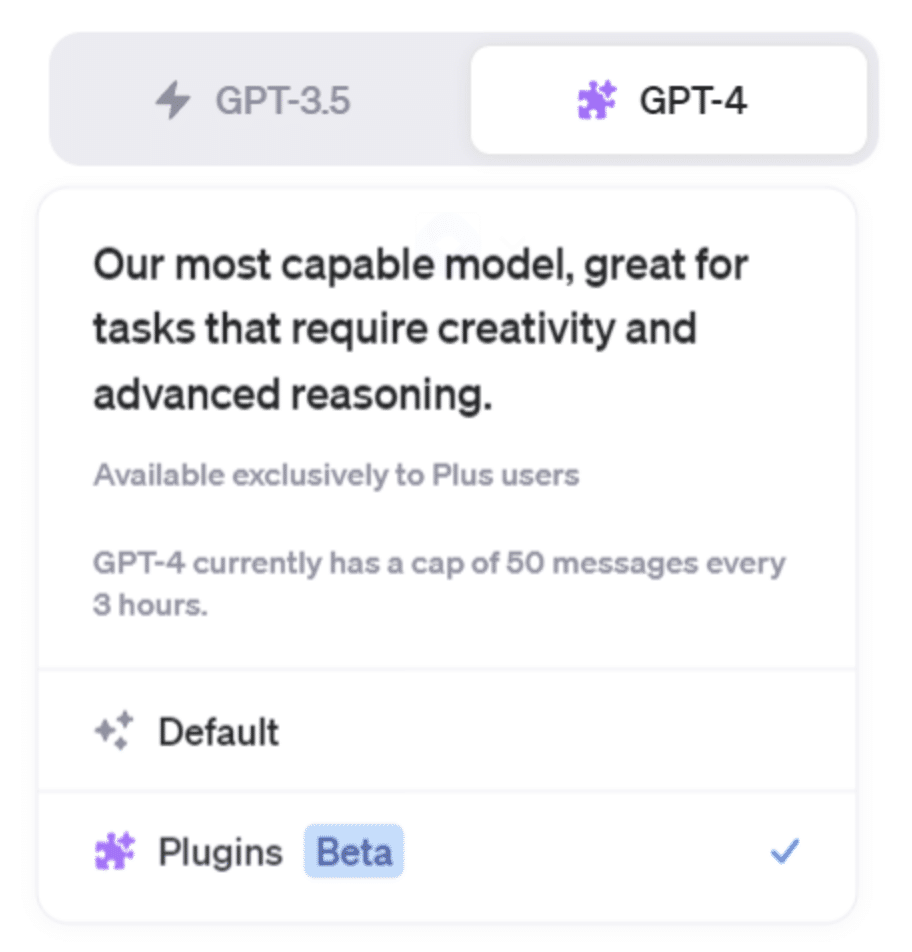

Use cases: ChatGPT plugins for SEO
Let’s dive in and explore four use cases of ChatGPT plugins that can supercharge your SEO strategies.
- Keyword research and analysis with Noteable
- SERP analysis with Bramework
- Content brief generation with Bramework
- Guest post strategy powered by WebPilot
1. Keyword research and analysis with Noteable
Tools: Noteable (ChatGPT plugin), Semrush (Keyword data)
Let’s revolutionize your approach to Keyword Research first. With ChatGPT and Noteable, you can now complete complex interpretations of keyword data at scale.
Noteable is a collaborative notebook platform that enables teams (and systems) to interact with and visualize data together – using SQL, Python, R, or no-code solutions.
The “collaborative notebook” element is where it shines for SEO. With Noteable, you can connect any data set to ChatGPT – enabling it to interpret the data, create visualizations, and even change or update it on your behalf.
Getting started with Noteable and ChatGPT
First, you will need a data set. Start with a keyword data export from Semrush or another keyword research tool.
The sample analysis used below is an export of related keywords for a new topic. Only keyword, monthly search volume, and keyword difficulty were included.
You will also need a Noteable account. Both free and paid tiers are available. Once you have set that up, you can build out your project.
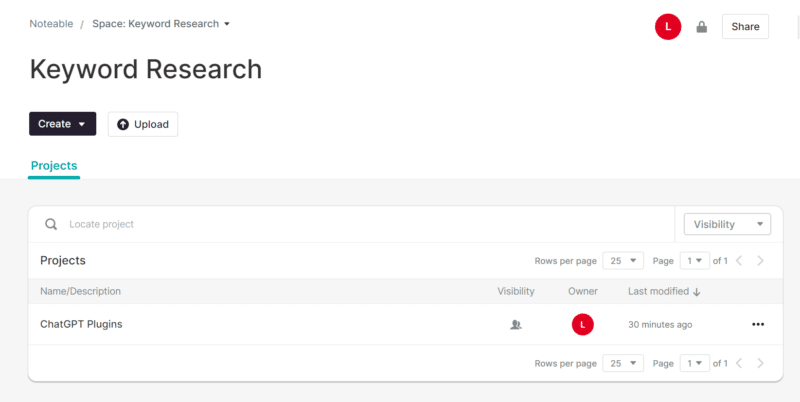

Step 1: First, create a Space. Think of the space as your overall container. This can be a brand, division, etc.
Step 2: Create a Project within your space. Copy the Project URL as you’ll need this for step 4.
Step 3: Within your project, you can now upload your .xlsx or .csv file for your data source. You can click on the uploaded data to open the file. Copy the URL; you’ll need this for step 4.
Step 4: In ChatGPT, activate the Noteable plugin in GPT-4. Create a new chat with the following prompt:
“Connect Noteable to new project: [Project URL from step 2]
Connect to this Excel file: [Data source URL from step 3]“
ChatGPT will now connect to your data set in Noteable. It will even identify if there are any connection errors and provide you with steps to resolve them.
Identifying and visualizing keyword opportunities
In this analysis, we are looking for high-volume keywords with relatively low competition for a new content opportunity. The seed keyword for this work is “chatgpt plugins”.
First up – visualize the data with a scatterplot. To do so, enter the following prompt (or similar) in ChatGPT:
“Generate a scatterplot illustrating the relationship between keyword difficulty (x axis) and search volume (y axis) for all listed keywords.
For the scatterplot, assign a color to each data point per the chart below.
Red = keyword difficulty > 70
Green = keyword difficulty < 50
Yellow = keyword difficulty is between 50 and 70″
ChatGPT will generate a scatterplot that enables you to visualize the keyword opportunities within your data set.
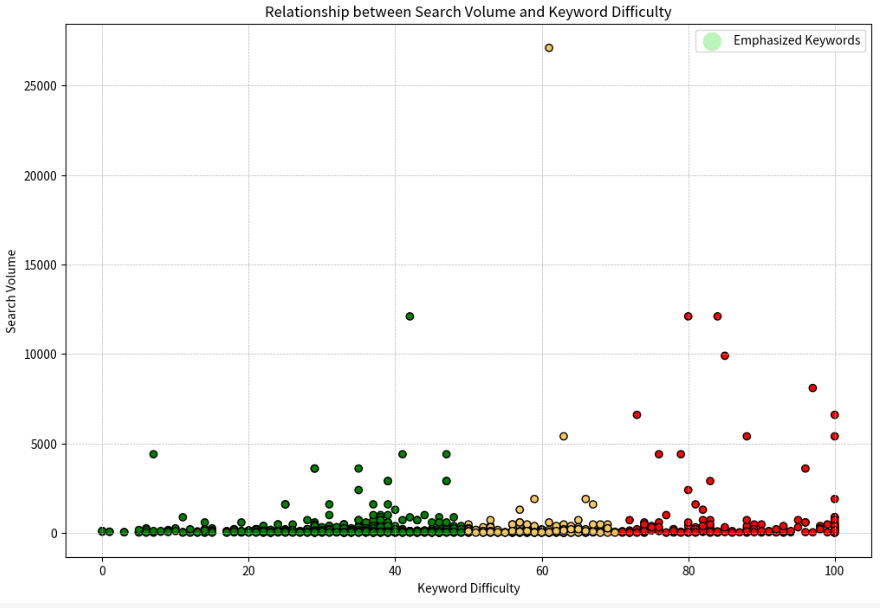

The sweet spot for optimization is in the green and yellow dots above the search volume baseline. These represent keywords with a moderate-to-high search volume with relatively low competition.
Next, we can ask ChatGPT to report all keywords in that group, giving us an actionable list.
In addition to the scatterplot, provide the list of keywords with a volume greater than 1,000 and keyword difficulty below 70.
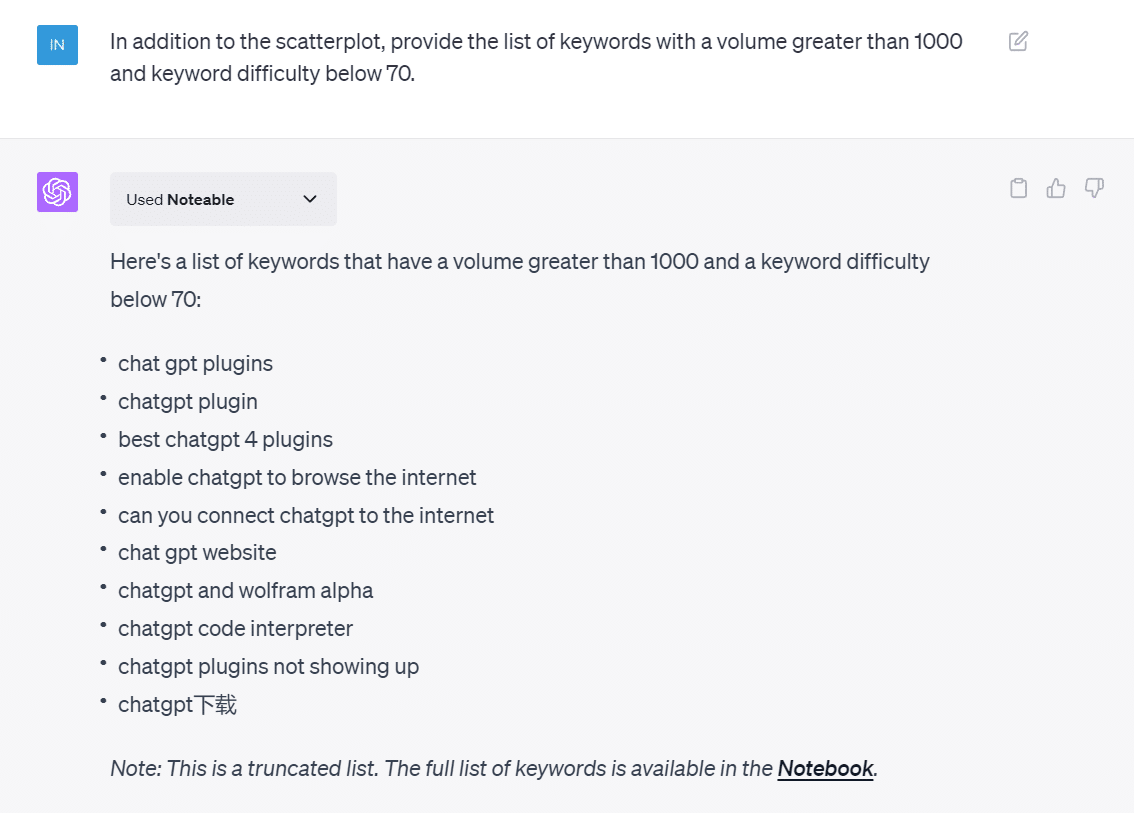

To take this a step further, save these opportunity keywords from this use case and provide them when generating the content brief outlined below.
Other SEO uses for Noteable
Noteable and ChatGPT are a powerful duo. Together they can tackle several challenging SEO analysis activities.
- Consider importing your website’s ranking keywords in your data set. This will allow you to run analysis on optimization opportunities within the existing content on the site.
- Visualize your website’s ranking or analytics data to generate reports with a cohesive look and feel.
- Import a full HTML page export from Screaming Frog to audit your website’s technical SEO.
2. Optimize existing webpages with Bramework
Tool: Bramework (ChatGPT plugin)
Bramework is a robust AI content generation platform. Its ChatGPT plugin is a free taste of what its software can do.
Where it really finds its stride is in SERP analysis – diving deep into your site’s performance in the search engine results page and sizing up the competition.
Dual analysis for enhanced insights
Bramework’s SERP Analysis and Content Competitive Landscape are distinct features of the plugin, each bringing unique insights.
- SERP Analysis dives into how your webpage’s content is optimized for the target keyword.
- The Content Competitive Landscape offers a detailed comparison of your content against industry rivals, pinpointing areas for improvement.
Merging these two capabilities into a single prompt creates a holistic view of the SERP opportunities for your content and your target keyword phrase – creating recommendations that will equip you to stand out amidst the competition.
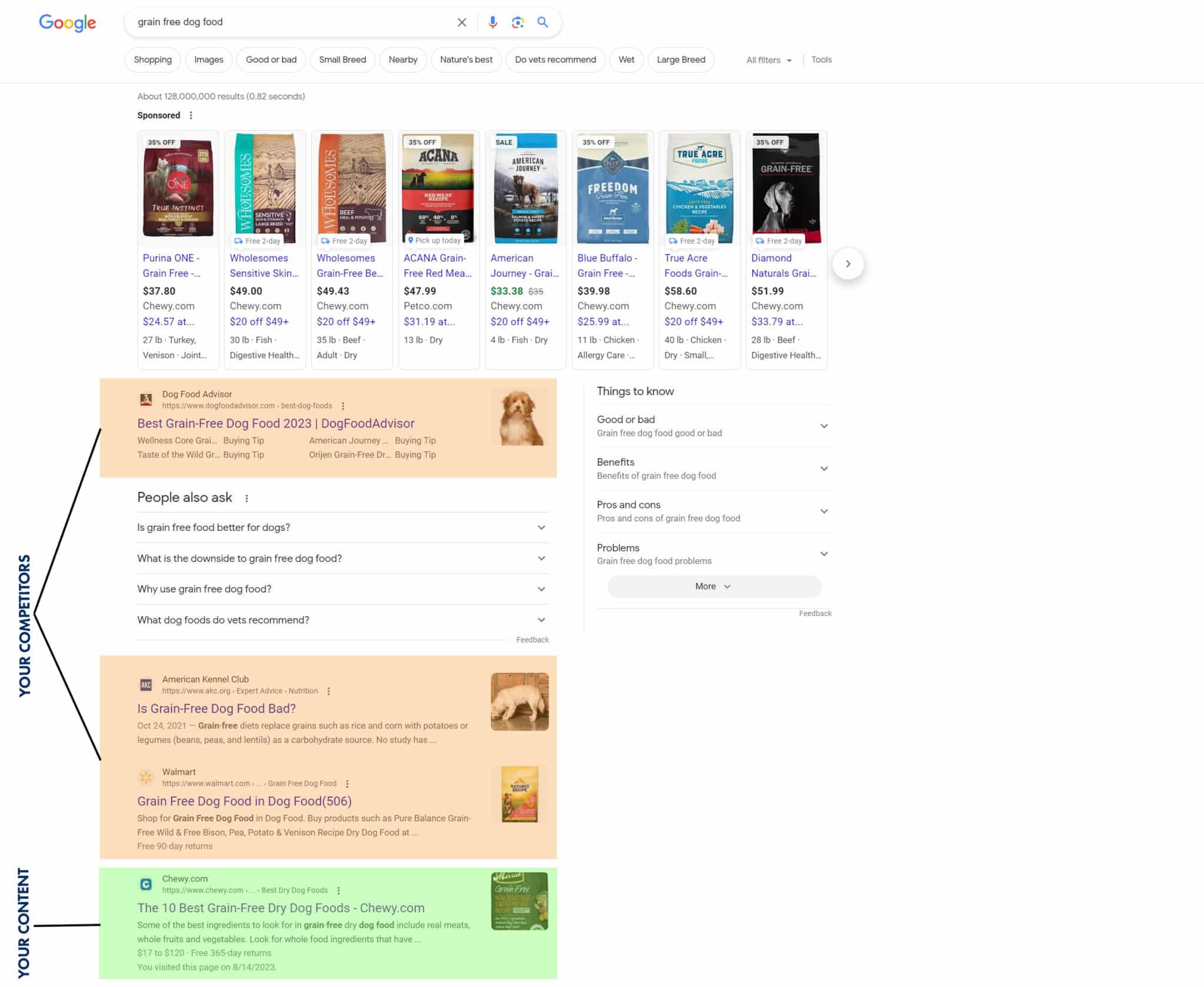

Using Bramework
To get started, simply activate the Bramework plugin in ChatGPT using GPT-4, and start entering prompts. The Bramework prompt below includes your target keyword, the webpage you are looking to optimize, and a list of ranking competitors.
Using Bramework conduct a SERP Analysis and Content Competitive Landscape for “insert target keyword.”
“For the SERP analysis, analyze this page: [Insert your page URL]
For the Content Competitive Landscape, compare against these competitors:
– [Insert list of competitors]“
The Bramework output will be broken into three unique segments:
- SERP analysis: Reveals your webpage’s optimization status for the target keyword across a series of on-page elements.
- Content Competitive Landscape: Dives into your competitor’s on-page optimization and how that may impact their rankings.
- Recommendations: Compiles insights driven by the SERP Analysis and Content Competitive Landscape to provide actionable recommendations for your webpage.
Bramework output the following Recommendations for the “grain free dog food” example used above.
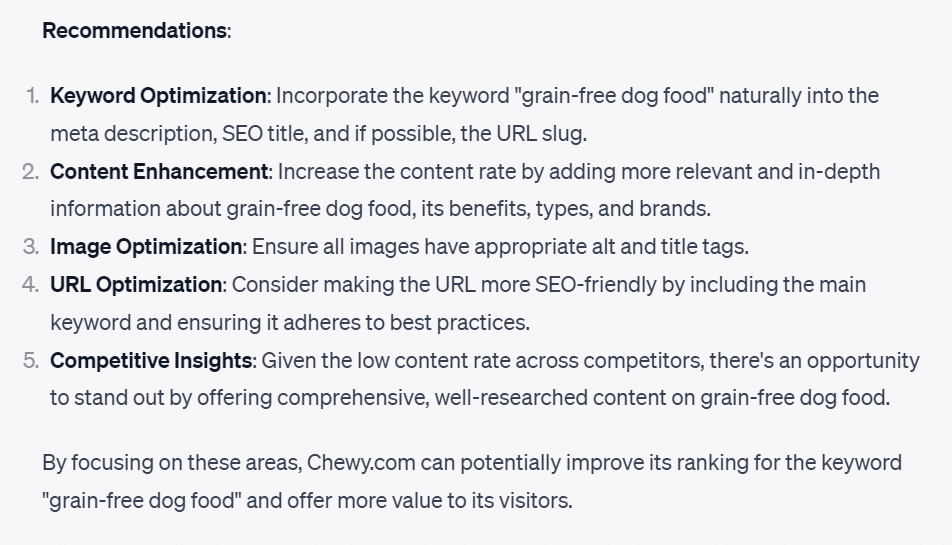

These recommendations combine insights from the on-page optimization analysis from your site and your competitors’ sites.
Additional on-page optimization plugins
Tool: SEO CORE AI (ChatGPT plugin)
If you want a deeper dive into only your on-page elements, consider turning to SEO CORE AI. This ChatGPT plugin analyzes your webpage against a long list of on-page optimization elements to create detailed recommendations.
Start with this prompt:
“Use SEO CORE AI to identify ten ways I can improve the ranking of my article for the target keyword below.
Article: [INSERT YOUR WEBPAGE URL]
Target Keyword: [INSERT YOUR TARGET KEYWORD]”
Example output:
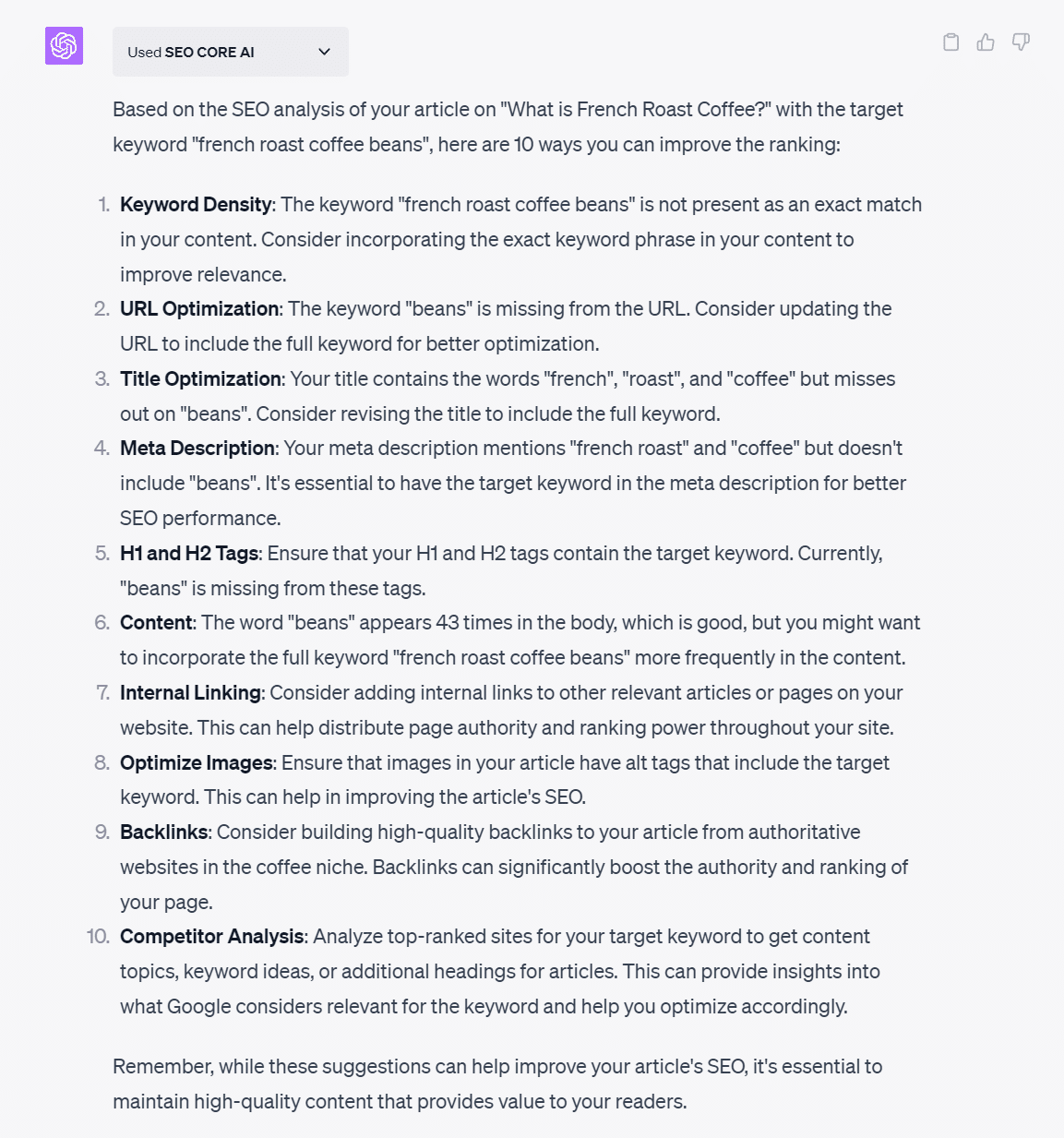

function getCookie(cname) {
let name = cname + “=”;
let decodedCookie = decodeURIComponent(document.cookie);
let ca = decodedCookie.split(‘;’);
for(let i = 0; i <ca.length; i++) {
let c = ca[i];
while (c.charAt(0) == ' ') {
c = c.substring(1);
}
if (c.indexOf(name) == 0) {
return c.substring(name.length, c.length);
}
}
return "";
}
document.getElementById('munchkinCookieInline').value = getCookie('_mkto_trk');
3. Content brief generation with Bramework
Tool: Bramework (ChatGPT plugin)
Another capability of the Bramework ChatGPT plugin that really shines is its swift and efficient generation of detailed content briefs.
By entering a simple prompt you can generate a comprehensive brief ready to be passed off to a copywriter.
Your prompt can be as detailed or as simple as you want to make it. For example, you can combine this with the keyword research strategies outlined above to integrate high-opportunity keywords in your brief.
As with most areas of ChatGPT, the more you give it, the more precise your brief will be. However, your prompt can be as simple as:
Use Bramework to generate a content brief for a new piece of content on “grain free cat food”
Bramework’s content brief output will include:
- Title
- Objective
- Target Audience
- Key Points to Cover
- Call to Action
- Tone and Style
- SEO Considerations
- Competitor Analysis
- Content Length
Creating effective copy briefs with Bramework can speed up your content production, resulting in higher-quality content on your site in less time.
While this use case highlights Bramework, other ChatGPT plugins can also generate detailed content briefs. These include:
- WebPilot
- ChatSpot
4. Guest post strategy powered by WebPilot
Tool: WebPilot (ChatGPT plugin)
Guest blogging is a link building strategy enabling SEOs to offer unique content in exchange for a strong backlink within the same industry or niche. Finding these websites that accept guest posts in your industry has never been easier.
Enter the WebPilot ChatGPT plugin, capable of streamlining some of the most complex SEO tasks, including building a guest posting strategy.
Identifying guest posting opportunities
First, install the WebPilot plugin in GPT-4. Then get started with a simple prompt:
“Identify a list of 20+ websites in the [INSERT NICHE NAME] niche that accept guest posts. These identified websites should be relevant for a guest posting campaign for [INSERT YOUR DOMAIN NAME].”
WebPilot will output a list of URLs that have previously accepted guest posts and are close to or within your chosen industry or niche.
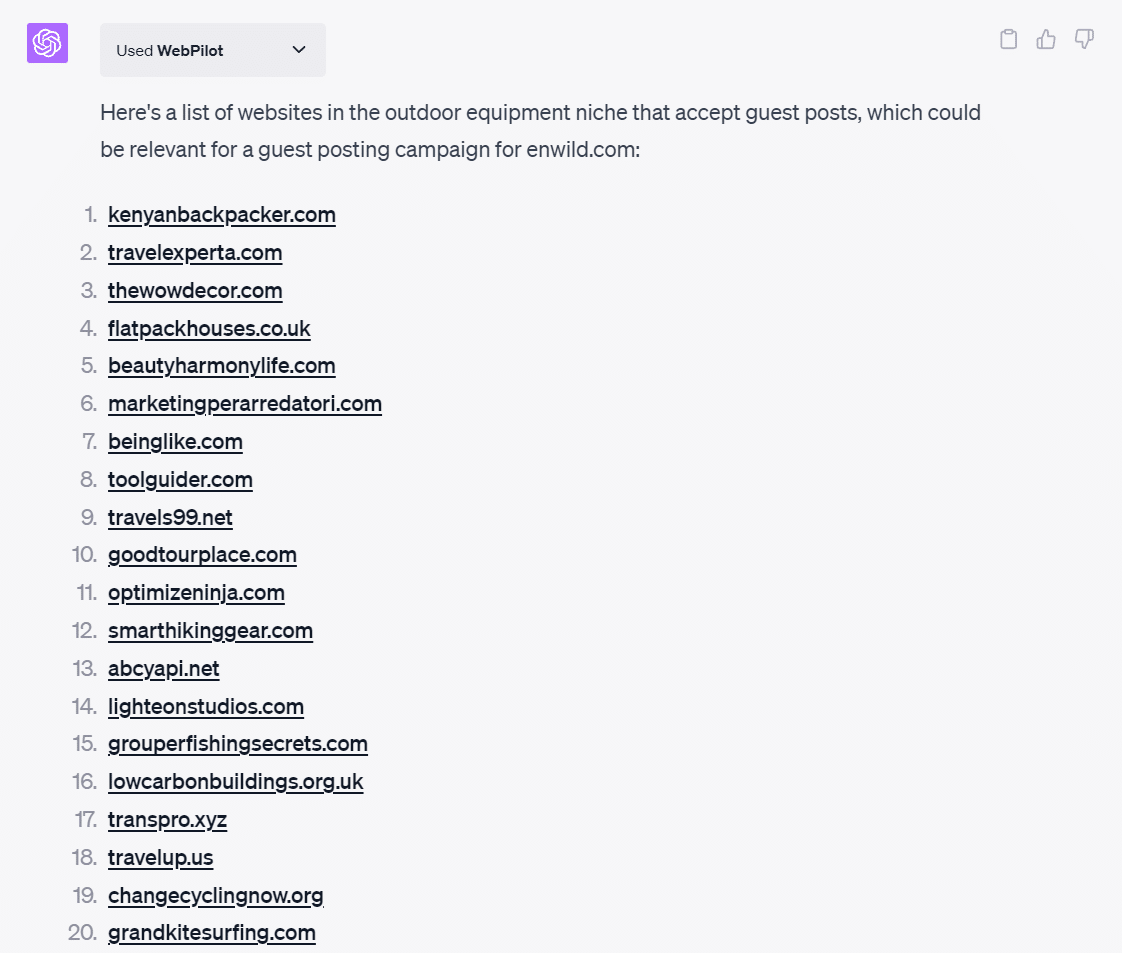

You’ll want to review each of the websites provided to verify its relevance.
Then build out a tracking sheet to track your outreach campaign. Something as simple as the sheet below will suffice.
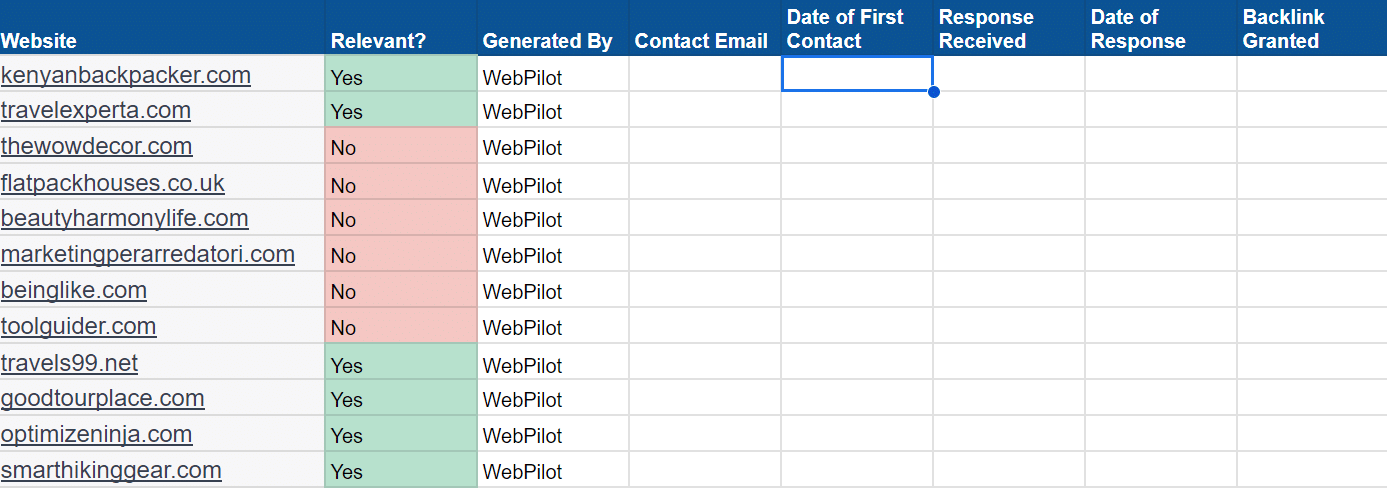

Simplify your outreach
You can even ask ChatGPT to generate your entire email funnel for the guest post campaign.
“Write a complete email funnel for the guest post outreach identified above.”
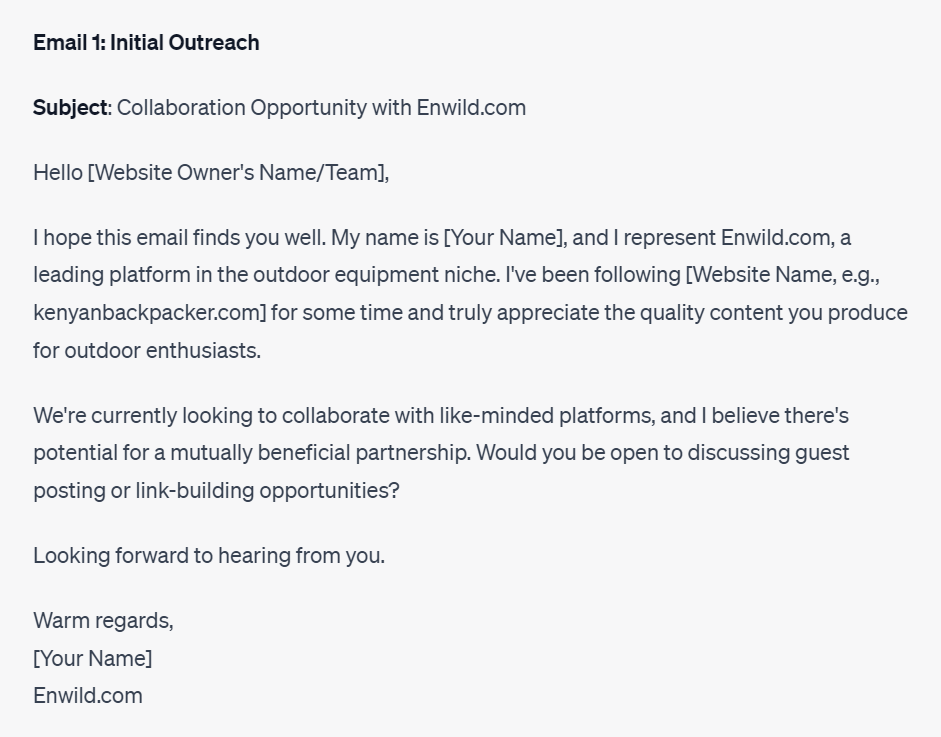

The next level of ChatGPT
With these four powerful use cases, we’re only at the tip of the ChatGPT iceberg.
While we’ve glimpsed its potential, the true depth of what ChatGPT and its integration plugins can achieve will continue to be explored.
Now consider combining these capabilities into a singular, comprehensive SEO strategy. This can give you a true SEO superpower – synergy, efficiency and results.
As we continue into the ChatGPT frontier, one thing is for sure – the SEOs that persistently test its limits will stay ahead of the game and their competition.
Opinions expressed in this article are those of the guest author and not necessarily Search Engine Land. Staff authors are listed here.
Related stories
@media screen and (min-width: 800px) {
#div-gpt-ad-3191538-7 {
display: flex !important;
justify-content: center !important;
align-items: center !important;
min-width:770px;
min-height:260px;
}
}
@media screen and (min-width: 1279px) {
#div-gpt-ad-3191538-7 {
display: flex !important;
justify-content: center !important;
align-items: center !important;
min-width:800px!important;
min-height:440px!important;
}
}
googletag.cmd.push(function() { googletag.display(‘div-gpt-ad-3191538-7’); });
–>
Original Source: How ChatGPT plugins can up your SEO game